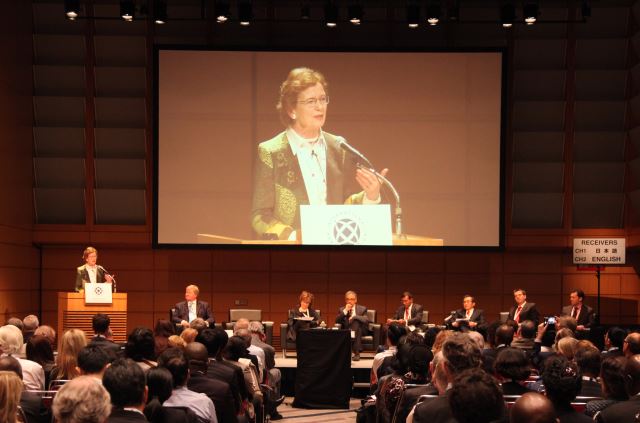Mary Robinson delivers keynote speech on climate justice and human rights at International Bar Association’s Annual Conference in Tokyo
Thanking the IBA’s Task Force for their hard work and congratulating them on the launch of their report “Achieving Justice and Human Rights in an Era of Climate Disruption”, Mary Robinson said during her key note speech on Wednesday, 22st October in Tokyo:
“The Task Force on Climate Change Justice and Human Rights has worked tirelessly and diligently to provide an assessment of the legal frameworks relevant to climate change and identify the steps needed to further develop them to respond to climate change and deliver climate justice.”
The IBA Task Force on Climate Justice was set up after the IBA’s annual conference in Dublin in 2012, were Mary Robinson challenged IBA President Michael Reynolds to provide leadership on climate justice.
Speaking at the “Climate Change Justice and Human Rights Showcase Session” during the Annual Conference 2014 in Tokyo, Mary Robinson highlighted the importance of the Task Force and the significance of the findings from the recently launched report which recommends that climate action is founded in human rights. She added:
“Quite honestly the report has surpassed my expectations and delivered an excellent contribution to the understanding of climate justice and the role of human rights law in addressing the climate challenge”.
Mary Robinson joined other keynote speakers the “Climate Change Justice and Human Rights Showcase Session” including Felipe Calderón, Chair, Global Commission on the Economy and Climate, former President of Mexico; Al Gore, former US Vice-President; Mohamed Nasheed, the first democratically elected President of the Maldives Island Republic; and Prof. Shinya Murase, Professor Emeritus, Sophia University, Tokyo.
During her speech, Mary Robinson reflected on the key findings and recommendations from the report, linking them to the ongoing climate negotiations within the UNFCCC, the upcoming climate agreement in Paris 2015 and the current work on climate action of the Human Rights Council.
The recommendation of the report are timely given that 28 Special Procedures Mandate Holders of the Human Rights Council just called on governments under the UNFCCC negotiations for the 2015 climate agreement to “respect, protect, promote and fulfil human rights for all” in all climate actions.
One of the recommendations the report makes suggests for the United Nations Office of the High Commissioner on Human Rights (OHCHR) to develop a model policy for corporations that commits them to reducing or preventing the climate change impacts attributable to their activities or to those of their contractors and suppliers. It also suggests corporations should be encouraged to implement a due diligence process that identifies and reduce their climate change impacts.
Mary Robinson concluded her speech with directly addressing the present representatives of the International Bar Association and by setting them a new challenge:
“There is an action in this report for each one of you to take forward in your work, engaging the legal profession around the world in securing justice and rights through action to mitigate and adapt to climate change.
My challenge to you this time is to deliver the recommendations in the report and be actors in the pursuit of climate justice. You can be and must be a constituency of demand that our political leaders can be informed and supported by to take the urgent action needed on all fronts.”
Related Links
Mary Robinson’s Keynote Speech
IBA Annual Conference – “Climate Change Justice and Human Rights Showcase Session
IBA Task Force Report: Achieving Justice and Human Rights in an Era of Climate Disruption
Open Letter signed by 28 UN Human Rights Experts
Watch and Listen to Kathy Jetnil-Kijiner’s intervention at the Climate Summit 2014
Incorporating Human Rights into Climate Action
The research summarised in this booklet is the product of an extensive survey conducted by the Foundation to assess the extent to which countries are respecting human rights in climate action. The research examined all National Communications submitted to the UNFCCC since 2010 along with any National Adaptation Plans of Action (NAPAs) submitted by Least Developed Countries (LDCs) over the same period. To further understand the landscape of human rights and climate change, the research also considered reports to the Universal Periodic Review (UPR) of the Human Rights Council (HRC) since 2010.


